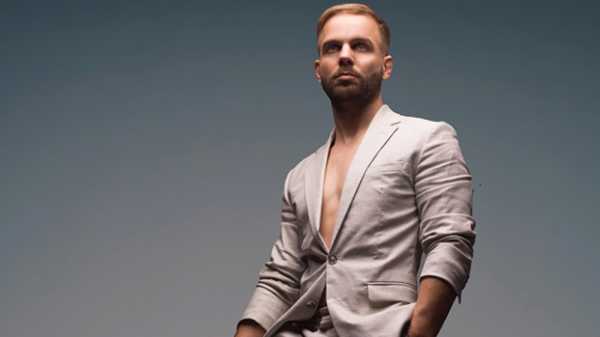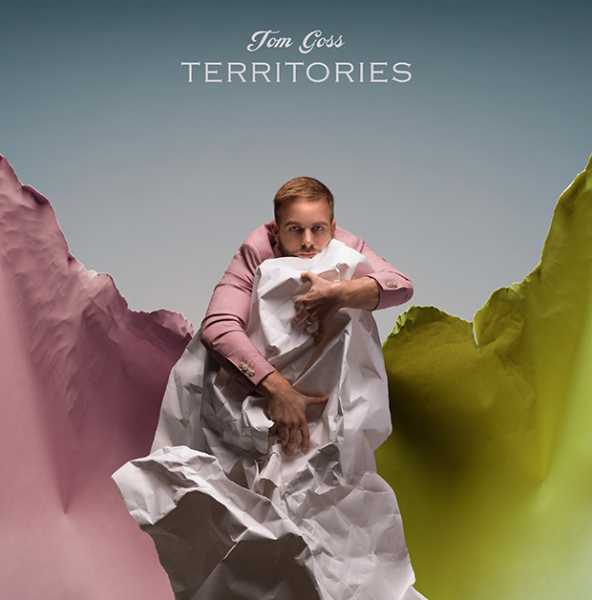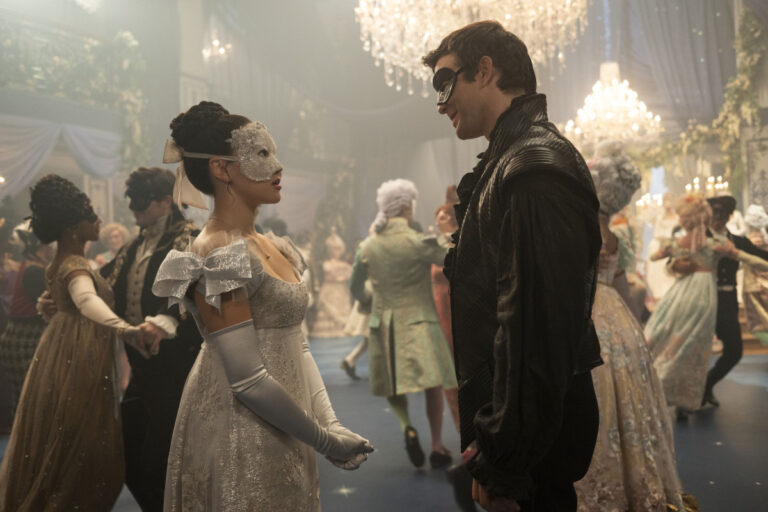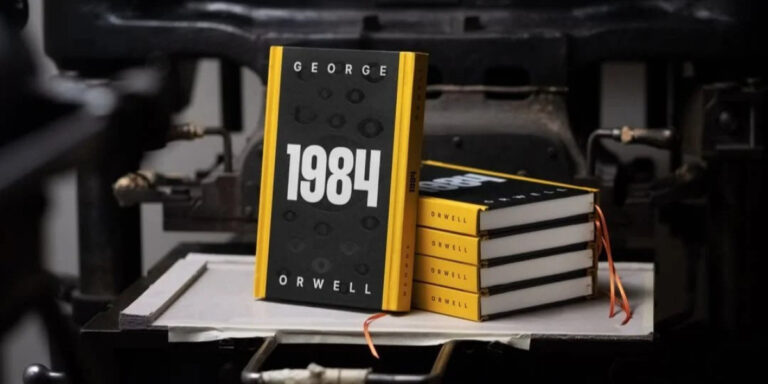
The moment when Tom Goss realizes that opening his marriage has left his love life changed forever is captured in his new video. He talks with us about ‘Quebec,’ his powerful ‘Territories’ album, and more.
“I want to live in a world where everybody can just love what they love and do it so openly, and live really positive lives,” says Tom Goss. Navigating a course to that world is the story of his 2019 album, Territories. Based on his personal experience of falling in love with another man after learning of his husband’s infidelity (which results in them deciding to open up their marriage), Territories recounts Tom’s foray into these uncharted romantic waters. One of the brightest guiding stars is “Quebec,” the pivotal moment when Tom and his husband realize the gravity of their situation, and how nothing may never be the same again.
That moment is recreated in the video for “Quebec,” featuring Mean Girls star Daniel Franzese as Tom’s husband. Tom sat down to speak EXCLUSIVELY with HollywoodLife about the video, and how Territories required him to take a leap both sonically and lyrically. The album — an enchanting electronic experiment – is a daring departure from his previously released work. Elements of pop, dance and jazz are woven together to create an intoxicating sonic experience. Those expecting another Wait or Turn It Around might be surprised at the emotional depth and creative experimentation of Territories. Still, if they trust Tom to guide them, they’ll be greatly rewarded when the journey comes to an end.
“I write music, and I make videos and films and tell stories, and I use that because I want to reach people,” Tom tells HollywoodLfie. “I want to connect with people, I want to move people, and I want them, in turn, to move me. That is my idea of success. That is what I’m here on this Earth to do.”
HollywoodLife: Correct us if we’re wrong, but it appears as if you wrote the first concept album about polyamory.
Tom Goss: I don’t know if that’s true or not, but I don’t know if anybody else has done it.
What motivated you to cover this topic as a whole album, as opposed to an EP or a single song?
Well, I didn’t set out to write a concept album. I was just going through so much stuff personally. I had fallen in love with another man, and I was trying to process that. I didn’t really have any guides in society for how to do that effectively. We’re told, especially in the art we consume, how we’re supposed to live in some ways, and I had no models. So, I just started thinking about these weird experiences that I was finding myself in, and questioning them and exploring them and prodding them. There’s a lot to dig through, so it was rife with content all the time. And I just kept writing, and the more I was writing, the more interesting I was finding the subject, the more interesting I was finding the idea of the social morays in which we exist, and which ones are good for me now or which ones aren’t good for me. How I was kind of picking that apart and throwing stuff to the side and taking some new rules in. I just found it really compelling, and I was deep in it.
Putting that much of your personal self in Territories sounds intimidating, but from what you’ve said in the past, you’ve always been the type of songwriter that uses your experiences as the base of your art.
I think for me that’s the strongest way to write. I’ve almost always written from personal experience. It sounds kind of obvious to say this, but when I write from personal experience, it speaks to me more. There’s never been anything happening in my life that I wasn’t writing about. Really, the only thing I wasn’t writing about was what started happening between me and my husband, and Territories is the combination of four years of experiences with him.
For the first three years, I was pretty silent about it, and that was really hard for me. But I understand why. I spent a dozen years crafting songs about my undying love for my husband, and they were all poppy, and they were all positive. But when writing Territories, I was having a very different experience in my home life. A very heavy experience, and a very challenging experience, and I wasn’t reflecting that in my music.

Franz Szony
I also had built a fan base of people who loved what I had previously written about, so taking a really sharp departure both topically and sonically was very frightening for me. I didn’t know how people were going to receive it. I didn’t know if everybody was just going to say, “we don’t like you anymore. This is what we liked about you, now you’re giving me this?” I’m the last person in the world that anybody would have thought would write the first concept album about polyamory. I was talking to a friend of mine yesterday, I had breakfast with him, and I’ve known him for 15 years. He’s like, “There’s no way in the world I ever thought you would be the person to do this. You would’ve been the last person in the world to do this.”
Why is that?
Because I’m a wholesome, earnest, Midwestern boy next door. That is who I am. And in some ways, I think that’s why this album works because I don’t approach it with an attitude of knowing. I don’t approach it with anything that’s in your face, or anything that’s really controversial. I’m approaching it as I’m trying to understand it as well. These are the experiences that I’m having. I’m feeling these things really strongly, and everything that I’m giving you, even though it’s sometimes conflicted, is good and positive. That’s always what I want to be putting out in the world.
You’ve just released the video for “Quebec,” which is an important chapter in the Territories story.
“Quebec” is the middle of a three-part in a series that I did with director Nathaniel Siri. “Berlin” is really the start of the story both actually and in this visual representation of it. I had met this guy, we had a really fun time and at some point in time (he lives in London) he said, “Hey if you ever want to come to Europe for the weekend, let me know. We’ll have a good time, no big deal”. So, I went to Berlin for the weekend, and I fell in love.
I came home and told my husband that I had fallen in love. Very difficult thing to do, as it is. I would say Quebec was post-Thanksgiving, so Quebec was probably late November, and I think I went to Berlin in August, so it was a couple months later that we were talking. We were processing, and we were figuring this thing out. We got to Quebec, and we were having a good time. We were walking down the street and he just stopped. I make fun of him because he’s not good at talking and walking at the same time, so if he stops, I know he wants to talk. He just broke down. He just completely broke down. It was like he was carrying the weight of what I had said (how I was in love with another man), and probably the guilt and the shame of the past two years and how everything went down, and how things were going. He looked at me, and he said, “We are not us. There is another us to us. We are not special. We are no longer special,” and that was the saddest thing I had ever heard and will ever hear in my life.
I was really working at that time to listen, to be really non-responsive. I didn’t want to say, “What do you mean? We are us.” I just wanted to be like okay, this is what he’s feeling, Tom. You have to hear this. You have to hear this so you can understand it, so you can be attentive to it, and you can be as expressive as he’s being to you, to him. We just kind of sat in this cloud of heaviness as a result of what had transpired and what he had said. There are several moments in this album where I wrote things down word for word that [my husband] said, and that is exactly what happened. It’s also living in sadness and also thinking, don’t forget this because this is really impactful stuff. As soon as we made it back to the Airbnb, I was like, “We are not us, there is another us to us. We are not special. We are no longer special.” I put it in my phone, I was like okay, good, now we can keep talking.
That is, word-for-word, the chorus of the song, so the song really describes, and all of these songs really describe the place and the feel of where we’re at. Then this one, in particular, it’s almost like a conversation. The chorus is “we are not us, there’s another us to us, we are not special, we are no longer special.” And then proceeds with our reactions, sitting in this really weird backward space. Yeah, I’m really excited about it. I think it’s a really compelling way to tell a story, the way that narrative switches a bit. So yeah, that’s what “Quebec” is about.
And you recreated this moment in the video with actor Daniel Franzese?
There’s always artistic license, but in many ways, it is a recreation. We were walking down the street, and that happened, and it kind of turned everything on its head, really. We worked on these elements in the video with Nathaniel Siri, and also in the production with Ian Carmichael, who produced this record. One of the things that I really wanted to do with “Quebec” is push how deeply my world turned on its head when my husband said what he said. We had opened the relationship, we were talking openly about it about it, and we were working our way through it. I’m like okay, I’m doing this right. I’m being open, I’m being honest. As soon as I fell in love, I told him. That’s the responsible, well-intentioned way to live right?

Franz Szony
But sometimes, well-intended actions have a negative and unintended reaction. When that reaction happened, and he said what he said, and this is the most important person in the world to me, now and forever. This is my husband. And I’m like, “Oh shit, what did I do? How did this go so wrong?” We’re both moving with honesty and intentionality but it was still hurting so much. So everything seemed upside down to me for a while, and I think that’s really where the writing started. We really wanted to chop it up, add glitches and bops. Even the bones were backwards as the song was originally written on a backwards piano. Now that it’s produced the piano is buried in the mix but, but that’s what I originally sent to Ian. The backwardness was the inspiration for the song, but he did heavy lifting on the production adding those glitchy elements, and then we got some guitars in there. We were always like, “No, it’s not uncomfortable enough. We need to turn more of these guitar notes backwards now,” so there are all these weird things happening in the audio. Things don’t seem like they’re in the right place, but they sound cool, and it’s all these weird backwards elements.
Then when Nathaniel and I were making the video and talking about the video, we really wanted to have a backwards element in that as well, so the whole second verse is one shot, shot backwards. I did everything backwards, and then the footage is reversed, so it looks like I’m moving forward, but it’s strange. You’re like, why are his eyes moving that way? His mouth is mostly in time, but some things are a little off, there are shoulder movements that don’t seem to make sense. So, I flipped the song and learned how to sing it backwards, which was very, very difficult.
We shot it backwards. I walked backwards, and I sang backwards, and we did all of our movements backwards. I think it’s a really, really powerful, powerful thing. You’ll see for yourself.
With Territories’ different sound and experimentation, is that the music direction you’re going to go from here? Or is this solely for this project?
I don’t think I’ll make the same record again, but I think that also means that I won’t make Wait again, or What Doesn’t Break again. You know what I mean? It’s like “yeah, I did that,” and I feel like I did this song really well. And I’m sure I’ll continue to play with electronic sounds and lush organ sounds and things like that, but I think my next project will be pretty different again.
What was your husband’s reaction to Territories and all of this?
He’s extremely, wonderfully supportive and loving, and I can’t imagine how difficult this has been for him, and how difficult it sometimes continues to be for him. You know, he came on tour with me in the fall, and he’s heard every incarnation of this record since I was writing it at 3:00 in the morning in the studio 20 feet away from our bed. It’s been really hard on him, but he’s never said to me, “You can’t write this. I don’t want people to know this”. And I feel eternally grateful for him being in my life.
And your audience? How have they reacted to Territories?
Honestly, it’s been overwhelmingly positive. Everybody’s really intrigued by the new sound. For the most part, people shared their stories with me, and I think that’s really the equalizing power of art. We think we are alone in this world, and then we hear something that makes us understand that there’s other people around us having the same emotional processes or having the same experience, and we feel like we are not alone. And I think that this record is doing that for people, and I’m very proud of that.
—
Territories is out now.
Sourse: hollywoodlife.com







